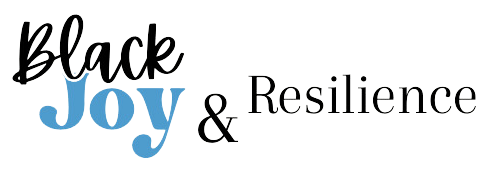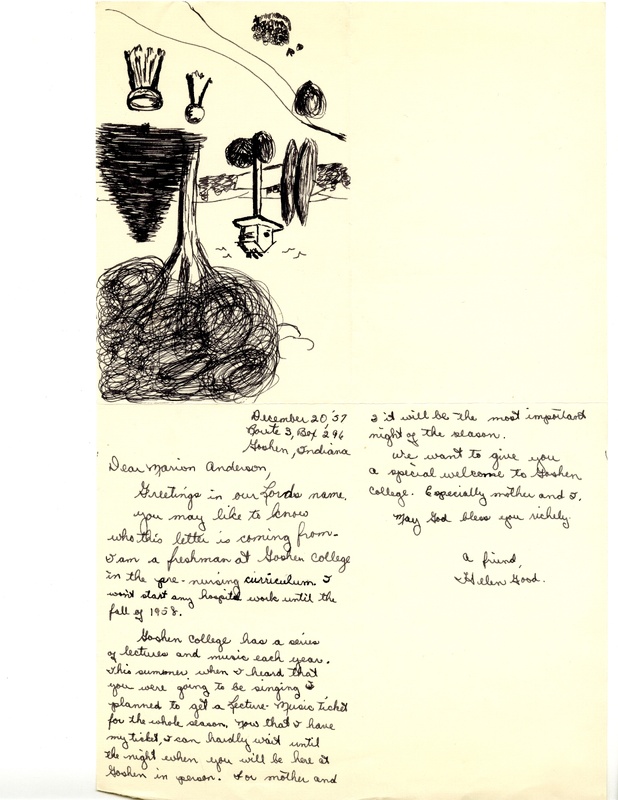-
Title
-
Letter, Helen Good to Marian Anderson, December 20, 1957
-
Description
-
This letter was sent by Helen Marie Good (March 15, 1939-) of Elkhart, Indiana to Marian Anderson (February 27, 1897-April 8, 1993) on April 17th, 1951. The letter was written by Good to introduce herself to Anderson, and to express her and her mother’s excitement to see her in concert at Goshen College in the summer of 1957.
-
Helen Marie Good was the daughter of Irven G. Good and M. Esther Hartzler (The Daily Pantograph 1979) . She had two brothers and two sisters (The Daily Pantograph 1979). She spent her life in and around Goshen College– having attended Wakarusa High School in Wakarusa, IN, and having lived at various residences in Elkhart, IN both about 11 miles away (U.S. Public Records Index 2019; Wakarusa High School 1954). Goshen College is located in Goshen, Indiana– in northern Indiana located between Chicago, IL and Detroit, MI. It is a private Hispanic-serving liberal arts college affiliated with the Mennonite Church (Goshen College, n.d.). Good and her family both were of the Mennonite religion (Lancaster Mennonite Historical Society 2014). Their bachelor degree-granting nursing program in which Good attended is the oldest one in Indiana (Goshen College, n.d.).
Anderson performed twice at Goshen’s Lecture-Music series– in March 1953 and February 1958 (Goshen College 2012). In 1958, Anderson had to stay ten miles from Goshen because Goshen hotels and motels because of severe racial discrimination; and unlike in non-sundown towns, it could have been endangered Anderson and/or the host family if someone like a Goshen professor had offered Anderson a place to stay for the night (Loewen 2005; Stoltzfus and Stoltzfus 2012). Defined as a place wherein “African-Americans were not allowed to have permanent residency and were required to leave before dark,” Goshen, Indiana was a sundown town (Amstutz and Evans 2012). Nevertheless, the Goshen News reported a sold-out show, and the performance was said to be “in its time on a par with the address by Martin Luther King years later” (Stoltzfus and Stoltzfus 2012, 4).
Marian Anderson was born and raised in South Philadelphia to John and Anna Anderson, and had two younger sisters (Penn Libraries, n.d.). She would grow up to reach international fame as a contralto classical singer, and symbol of success and resilience (Penn Libraries, n.d.). Her singing career began in her family’s church chorus, and she sang and studied music and performance at William Penn High School and South Philadelphia High School for Girls (Penn Libraries, n.d.). Her church, local organizations, and the greater Black community helped to financially support and advance her early educational journey (Penn Libraries, n.d.). These opportunities and connections propelled her to local and regional fame; having first performed at the Philadelphia Academy of Music in 1918 and with the New York Philharmonic in 1924 (Penn Libraries, n.d.). She studied the arts internationally, making her first trip to Europe in 1928 (Penn Libraries, n.d.). At first funded by foundations and scholarships who saw immense talent in her, Anderson would continue to tour and travel internationally through her career (Marian Anderson Museum, n.d.).
Anderson is appreciated for paving the way for future Black performers, as she was the first Black female to perform at Carnegie Hall in 1928, the first Black singer to perform at the Metropolitan Opera in 1955, and the first Black singer to perform at a Presidential Inauguration in 1957 (Marian Anderson Museum, n.d.). She experienced racism in the United States more than other countries, and gently protested this in ways such as insisting auditorium seating be integrated, and “refus[ing] to sing where the audience was segregated” (National Marian Anderson Museum, n.d.). In 1936, Anderson performed at the White House in Washington, D.C. In 1939, she was to perform again in D.C.– her manager Sol Hurok suggested that she perform at Constitution Hall, the capital’s largest concert hall seating up to 3,702 people (Daughters of the American Revolution, n.d.). It is operated by the Daughters of the American Revolution, and they denied her the opportunity to perform due to the color of her skin (Penn Libraries, n.d.; DAR Public Relations, n.d.). Instead, she performed on Easter for over 75,000 people (plus radio listeners) on the steps of the Lincoln Memorial (National Marian Anderson Museum, n.d.).
Anderson received a plethora of awards, appointments, and over fifty honorary degrees including: an honorary membership in Alpha Kappa Alpha; honorary degrees from Howard University, Temple University, Smith College, and more; NAACP Spingarn Medal in 1939; the Philadelphia Award established by Edward Bok of which was particularly meaningful to her in 1941; appointment to the National Council on the Arts in 1966; the United Nations Peace Prize in 1972; Congressional Medal by President Carter in 1978; as well as the Grammy Lifetime Achievement Award in 1991 (Penn Libraries, n.d.; Anderson 1955, pp. 273-275; Marian Anderson Museum, n.d.).
-
Rights
-
Copyright restrictions may exist. For most library holdings, the Trustees of the University of Pennsylvania do not hold copyright. It is the responsibility of the requester to seek permission from the holder of the copyright to reproduce material from the Kislak Center for Special Collections, Rare Books and Manuscripts.
-
Date
-
December 20, 1957
-
Format
-
Text
-
Language
-
eng
-
Spatial Coverage
-
Goshen, Indiana
-
Contributor
-
University of Pennsylvania: Kislak Center for Special Collections, Rare Books and Manuscripts
-
Extent
-
1 page
-
Identifier
-
Ms. Coll. 200 Box 126
-
transcription
-
December 20, '57 Route 3, Box 296 Goshen, Indiana
Dean Marion Anderson, Greetings in our Lords name. you may like to know who this letter is coming from. I am a freshman at Goshen College in the pre-nursing curriculum. I won't start any hospital work until the fall of 1958.
Goshen College has a series of lectures and music each year. This summer when I heard that you were going to be singing I planned to get a Lecture- Music Ticket for the whole season. Now that I have my ticket, I can hardly wait until the night when you will be here at Goshen in person. For mother and I it will be the most important night of the season.
We want to give you a special welcome to Goshen College. Especially mother and I.
May God bless you richely.
A friend, Helen Good.
-
Subject
-
Anderson, Marian, 1897-1993.
-
Contraltos– United States– Biography.
-
Fan mail--United States.
-
Goshen College


